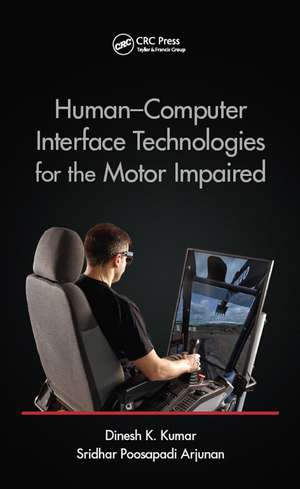Human-Computer Interface Technologies for the Motor Impaired: Rehabilitation Science in Practice Series
Autor Dinesh K. Kumar, Sridhar Poosapadi Arjunanen Limba Engleză Hardback – 20 oct 2015
Easily and readily understood by researchers, engineers, clinicians, and the common layperson, the book describes a number of HCI technologies ranging from simple modification of the computer mouse and joystick to a brain–computer interface (BCI) that uses the electrical recording of the brain activity of the user. The text includes photographs or illustrations for each device, as well as references at the end of each chapter for further study.
In addition, this book:
- Describes the mechanical sensors that are used as an interface to control a computer or screen for the aged and disabled
- Discusses the BCI using brain waves recorded by noninvasive electrodes to recognize the command from the user
- Presents the myoelectric interface for controlling devices such as the prosthetic/robotic hand
- Explains the technology of tracking the eye gaze using video
- Provides the fundamentals of voice recognition technologies for computer and machine control applications
- Examines a secure and voiceless method for the recognition of speech-based commands using video of lip movement
Din seria Rehabilitation Science in Practice Series
- 15%
 Preț: 540.06 lei
Preț: 540.06 lei - 8%
 Preț: 391.89 lei
Preț: 391.89 lei -
 Preț: 357.74 lei
Preț: 357.74 lei - 5%
 Preț: 360.33 lei
Preț: 360.33 lei - 15%
 Preț: 461.03 lei
Preț: 461.03 lei - 21%
 Preț: 446.23 lei
Preț: 446.23 lei - 15%
 Preț: 585.27 lei
Preț: 585.27 lei - 27%
 Preț: 454.52 lei
Preț: 454.52 lei - 23%
 Preț: 456.63 lei
Preț: 456.63 lei - 15%
 Preț: 568.28 lei
Preț: 568.28 lei - 23%
 Preț: 940.83 lei
Preț: 940.83 lei - 23%
 Preț: 368.98 lei
Preț: 368.98 lei - 18%
 Preț: 1245.81 lei
Preț: 1245.81 lei - 15%
 Preț: 577.12 lei
Preț: 577.12 lei - 18%
 Preț: 807.03 lei
Preț: 807.03 lei - 23%
 Preț: 427.84 lei
Preț: 427.84 lei - 18%
 Preț: 319.68 lei
Preț: 319.68 lei - 18%
 Preț: 320.94 lei
Preț: 320.94 lei - 22%
 Preț: 372.54 lei
Preț: 372.54 lei - 15%
 Preț: 431.75 lei
Preț: 431.75 lei - 5%
 Preț: 909.06 lei
Preț: 909.06 lei - 18%
 Preț: 786.38 lei
Preț: 786.38 lei -
 Preț: 436.14 lei
Preț: 436.14 lei
Preț: 763.78 lei
Preț vechi: 1027.17 lei
-26% Nou
Puncte Express: 1146
Preț estimativ în valută:
146.15€ • 152.90$ • 121.41£
146.15€ • 152.90$ • 121.41£
Comandă specială
Livrare economică 12-26 martie
Doresc să fiu notificat când acest titlu va fi disponibil:
Se trimite...
Preluare comenzi: 021 569.72.76
Specificații
ISBN-13: 9781482262667
ISBN-10: 1482262665
Pagini: 214
Ilustrații: 50
Dimensiuni: 156 x 234 x 18 mm
Greutate: 0.43 kg
Ediția:1
Editura: CRC Press
Colecția CRC Press
Seria Rehabilitation Science in Practice Series
Locul publicării:Boca Raton, United States
ISBN-10: 1482262665
Pagini: 214
Ilustrații: 50
Dimensiuni: 156 x 234 x 18 mm
Greutate: 0.43 kg
Ediția:1
Editura: CRC Press
Colecția CRC Press
Seria Rehabilitation Science in Practice Series
Locul publicării:Boca Raton, United States
Cuprins
Introduction. Human–computer interface: Mechanical sensors. Brain–computer interface based on thought waves. Evoked potentials-based brain–computer interface. Myoelectric-based hand gesture recognition for human–computer interface applications. Video-based hand movement for human–computer interface. Human–computer interface based on electrooculography. Video-based eye tracking. Speech for controlling computers. Lip movement for human–computer interface.
Notă biografică
Dinesh K. Kumar received a B.Tech from IIT Madras, and a Ph.D in biomedical engineering from IIT Delhi and AIIMS, Delhi. He is a professor and leader of biomedical engineering at RMIT University, Melbourne, Australia. Dr. Kumar has published more than 330 refereed papers in the field, and his interests include muscle control, affordable diagnostics, and human–computer interface. He is editor of multiple journals, chairs a range of conferences related to biomedical engineering, and enjoys walking in nature in his spare time.
Sridhar Poosapadi Arjunan received a B.Eng in electronics and communication from the University of Madras, India; a M.Eng in communication systems from Madurai Kamaraj University, India; and a Ph.D in biomedical signal processing from RMIT University, Australia. He is currently a postdoctoral research fellow with Biosignals Lab at RMIT University. Dr. Poosapadi Arjunan is a recipient of the RMIT SECE Research Scholarship, CASS Australian Early Career Researcher Grant, and the Australia-India ECR Fellowship. His major research interests include biomedical signal processing, rehabilitation study, fractal theory, and human–computer interface applications.
Sridhar Poosapadi Arjunan received a B.Eng in electronics and communication from the University of Madras, India; a M.Eng in communication systems from Madurai Kamaraj University, India; and a Ph.D in biomedical signal processing from RMIT University, Australia. He is currently a postdoctoral research fellow with Biosignals Lab at RMIT University. Dr. Poosapadi Arjunan is a recipient of the RMIT SECE Research Scholarship, CASS Australian Early Career Researcher Grant, and the Australia-India ECR Fellowship. His major research interests include biomedical signal processing, rehabilitation study, fractal theory, and human–computer interface applications.
Descriere
This book provides insight into the potential interface technologies between humans and computers or computerized machines that are suitable for people who do not have the control of their hands. The book describes the past, present, and future human computer interface (HCI) technologies and the applications of these to better the lives of people living with disabilities and also other applications such as computer gaming and defense. The limitations and current research activities of HCI technologies are highlighted as well.
